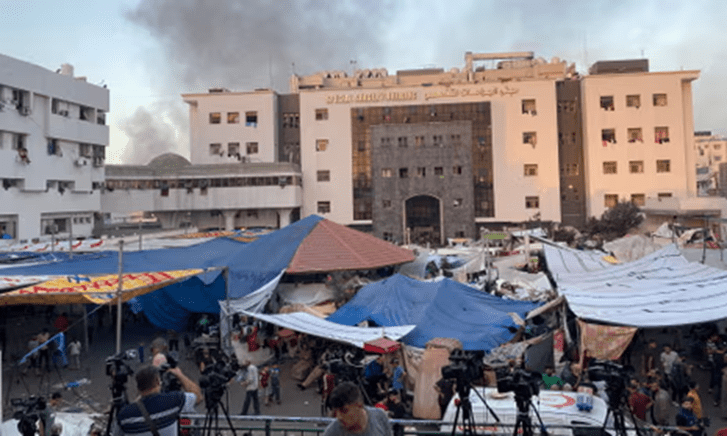Starbucks Strike 2023: Why Are Starbucks Workers On Strike?
Starbucks workers on strike do so in order to raise their collective voice and address a slew of systemic

Starbucks workers on strike do so in order to raise their collective voice and address a slew of systemic concerns at their company. The phrase “Starbucks workers on strike” evokes a range of worries about various aspects of their employment. The need for decent compensation commensurate with the severe demands of their roles is foremost among these. These strikes represent a fight for equitable wages that reflects the critical contributions made by these employees to Starbucks’ profitability and success. Furthermore, the phrase “Starbucks workers on strike” reflects broad discontent with working conditions.
Starbucks strike 2023 update: Why are Starbucks Workers on strike?
The protests brought to light chronic understaffing concerns that worsen the workload, resulting in employee burnout and stress. These strikes frequently represent a call for consistency in scheduling procedures, with the goal of providing workers with the stability and work-life balance that is currently lacking. Plus, the phrase “Starbucks workers on strike” echoes the call for better benefits, encompassing demands for comprehensive healthcare coverage, adequate parental leave, and a push for more full-time positions to replace the prevalence of part-time roles, which frequently lack adequate benefits. Furthermore, these rallies reflect a significant desire for the ability to unionize without fear of punishment, underscoring the importance of collective bargaining power in effectively addressing concerns.
The phrase “Starbucks workers on strike” represents a united front against what they perceive to be exploitative labor practices, and it serves as a testament to their unwavering determination to effect substantive changes in their workplace, pursuing equitable treatment, dignity, and a fair share of the company’s prosperity. These strikes are part of a larger story of workers’ rights activism, inspiring discussions and actions concerning fair salaries, humane working conditions, and the fundamental right to organize and collectively bargain for improved terms of employment.

Starbucks strike 2023 update: Have Starbucks Employees gone on strike in the past?
Starbucks employees in the United States have actively participated in a variety of protests, strikes, and rallies, using collective action as a platform to magnify their complaints about various aspects of their employment. Starbucks workers on strike have become essential in calling attention to a variety of labor-related concerns in recent years, with a particular emphasis on salaries, working conditions, and the right to unionize. Employees from many Starbucks outlets in Buffalo, New York, launched a walkout in late 2021, serving as a powerful signal of their displeasure with current employment circumstances.
Starbucks workers on strike’s main demands centered on the urgent need for fairer wages that reflect the value of their labor, the unrestricted ability to form unions without fear of repercussions, and the improvement of working conditions that have long been plagued by understaffing and erratic scheduling practices. Starbucks workers on strike, aided by the Service Employees International Union (SEIU), strategically underlined the need for a living wage that corresponds to the constantly rising cost of living, echoing a broader public concern for economic justice. The impact of the Buffalo strike was felt across social media channels, garnering tremendous traction and widespread support from labor rights organizations. This solidarity amplifies workers’ voices and draws attention to the many issues faced not only by Starbucks employees, but also by service industry workers in general.
The Buffalo walkout, however, was not an isolated episode; similar localized protests and strikes have occurred at numerous Starbucks locations across the country. These demonstrations by Starbucks workers on strike have converged around a common subject of campaigning for equal pay, improved benefits, and more job security. The breadth and depth of these collective activities highlight the systemic difficulties common in the coffee and service industries, sparking broader social discussions about workers’ rights, corporate accountability, and employee ethics. These protests by Starbucks workers on strike, with their thunderous pleas for reform and fairness, have sparked broader discussions about labor standards, workplace dignity, and the need for firms to prioritize employee well-being. Starbucks workers on strike represent a concerted attempt to challenge the existing quo, demanding meaningful reforms that assure adequate salaries, humane working conditions, and workers’ empowerment to exercise their right to organize and bargain collectively. These initiatives have an impact beyond Starbucks, influencing public conversation on socioeconomic fairness and the need for a more just and equitable work landscape across numerous businesses.

Starbucks Strike 2023 Update: Is Striking Effective For Starbucks Workers?
The multifaceted nature of evaluating the effectiveness of Starbucks workers on strike involves a complex interplay of various elements that extend beyond immediate outcomes. Starbucks workers on strike serve as a formidable tool wielded by employees to collectively voice their concerns and spotlight pressing issues encompassing wages, working conditions, and the fundamental right to unionize. Their significance lies not just in the tangible, immediate changes they may effectuate but also in the broader, long-term implications they bring to the forefront.
These strikes, resonating with the phrase “Starbucks workers on strike,” have proved instrumental in shedding light on the myriad challenges faced by Starbucks employees, thrusting these concerns into the public spotlight and sparking robust discussions on labor rights and equitable treatment within the service industry. Through these collective actions, workers have garnered considerable attention from media outlets and received substantial support from various labor advocacy groups.
This heightened visibility has been pivotal in raising awareness about the plight of service industry workers, amplifying their voices, and prompting wider societal conversations regarding corporate responsibility and the ethical treatment of employees. However, delineating the direct impact of strikes on affecting substantial, immediate changes within Starbucks operations presents inherent complexities. While strikes have the potential to instigate localized negotiations and yield incremental improvements, achieving overarching, systemic reforms across the entire corporation might necessitate sustained efforts and ongoing engagement. The outcomes are contingent on numerous factors, including the level of unity among workers, the resonance of their cause with the public, legal frameworks governing labor rights, and the responsiveness of Starbucks management.
While some Starbucks workers on strike might lead to specific improvements in certain locations, achieving comprehensive and enduring transformations across a corporate entity as expansive as Starbucks might require protracted negotiations and strategic planning. It’s crucial to recognize that the influence of strikes extends beyond immediate concessions, as their impact lies in catalyzing discussions, shaping public perceptions, and laying the groundwork for future advocacy efforts. The resonance of these strikes underscores the imperative for continual dialogue, persistence, and concerted efforts to secure meaningful, lasting changes that address the broader systemic issues faced by Starbucks workers. Hence, while the direct, immediate impact of strikes might seem challenging to quantify, their effectiveness in effecting lasting, widespread change hinges on sustained engagement, perseverance, and ongoing dialogue between workers, stakeholders, and management beyond the episodic periods of strikes.

Starbucks Strike 2023 Update: Why Are Starbucks Workers On Strike In 2023?
Thousands from hundreds of unionized stores had Starbucks workers on strike just on Thursday which marks an immensely pivotal moment in their nearly two-year-long organizing effort. Despite the duration of their organizing drive, the Starbucks workers on strike expressed frustration over the absence of their first contract. Termed as the “Red Cup Rebellion,” this strike aimed to draw attention to their plight and demand negotiations for contracts that would establish essential workplace conditions, including fair pay, adequate benefits, and staffing levels.

Unlike recent strikes by other unions, such as the United Auto Workers at major automakers or SAG-AFTRA and the Writers Guild of America in the entertainment industry, which led to production halts in movies and TV shows, the Starbucks workers on strike only planned for it to be a one-day event. The Starbucks Workers United union has been active since 2021, successfully organizing over 360 stores encompassing approximately 9,000 workers. The Starbucks workers on strike served as a focused call for the establishment of concrete agreements to address the critical needs of the workforce within these unionized locations.
Stay tuned for more in our lifestyle news.Click here







